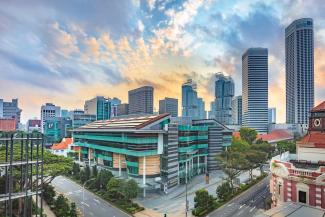
Singapore, 5 October 2023 (Thursday) – Singapore Management University’s (SMU) Lee Kong Chian School of Business (LKCSB) has affirmed its standing as holding one of the world’s best MBA programmes, according to the QS 2024 Global MBA Rankings. The School’s MBA programme was ranked 6th in Asia and 43rd worldwide, amongst 315 MBA programmes from 48 locations around the globe.
The annual rankings, newly released by QS on 25 October 2023, are based on metrics evaluating each university’s performance across weighted indicators. This is the first time that SMU LKCSB participated in the rankings, with the MBA programme performing within the top 13.7 per cent globally amongst more than 300 global peers.
Professor Bert De Reyck, Dean of SMU’s Lee Kong Chian School of Business, commented, “This achievement underscores the global stature of the SMU Lee Kong Chian School of Business and its MBA programme. Being relatively young by world standards, our MBA programme has nonetheless honed its edge through our continual effort to arm our graduates with pragmatic skills that are in demand by business and industry. Our strong performance within the global top 50 at this year’s QS Rankings signals that we are making strides in our mission of nurturing diverse graduates for a world of work that is rapidly evolving.”
About the SMU MBA programme
Started in 2009, the SMU MBA is well recognised as a programme that offers a purposefully planned curriculum with an Asian perspective, delivered by a strong faculty panel with extensive teaching and industry track record. THE SMU MBA offers flexibility in not only having two intakes a year, it also allows for its full-time MBA programme to be completed in 10 months or in 15 months, while the part-time MBA programme can be completed between 15 months or 18 months.
The programme comprises real-world learning from a blend of award-winning case studies on Asian and best practices of Western companies, interactive seminar-style pedagogy and exposure to an internationally diverse faculty. The curriculum is constantly updated to ensure that the programme keeps pace with the changes in its environment. The SMU MBA programme prepares our students to be digitally ready, analytics savvy and ESG conscious as well as being responsible economic citizens.
Students also benefit from the opportunities to engage with outstanding leaders from the business community, and an immersive and international learning experience comprising overseas exchanges and Overseas Immersion Programme (OIP). Post graduation, MBA students are offered the option of enrolling in complimentary MBA elective classes at SMU, to keep up with industry trends and take advantage of learning opportunities.
About the Ranking methodology
SMU’s MBA programme scored (out of 100) above the global average for four out of five indicators: thought leadership 88.5 (global average 51.8); return on investment 85.4 (global average 62.9); employability 64.7 (global average 45.7); and diversity 65.0 (global average 60.1).
The QS Thought Leadership metric comprises three elements. First, an Academic Reputation Index which evaluated responses from over 200,000 academics in 60 countries around the world; second, Research Impact which measures faculty productivity in specific academic fields; and third, PhD Faculty which refers to the percentage of the Business School faculty with PhDs. Thought Leadership reflects 15% of the total ranking score.
The QS Return on Investment metric reflects the average return on investment for specific business schools based on factors such as tuition levels, opportunity costs, salary growth, and expected career progression; as well as the time it would take for the graduate to pay back their investment. Return on Investment reflects 20% of the total ranking score.
The QS Employability metric, which has been running over the last five years, asks tens of thousands of global employers from which schools they prefer to hire business school graduates. It also assesses the percentage of graduates who accepted job offers three months post graduation. Employability reflects 40% of the total ranking score.
The QS Diversity metric reflects the gender balance and international mix, of faculty and the student body. Diversity reflects 10% of the total ranking score.
By consolidating insights from thousands of employers, graduates and academics, the QS Rankings give a glimpse at the global landscape for MBA degrees and help candidates make a more informed decision of a postgraduate programme. SMU LKCSB, which placed among the global top 50 here, is consistently ranked amongst the world’s best, being one of the youngest business schools in the world and the only Singaporean business school to achieve ‘Triple Crown’ accreditation in 2018. This distinction of being triple accredited by the Association to Advance Collegiate Schools of Business (AACSB), AMBA and European Quality Improvement System (EQUIS) is held by a select group of business schools around the world.